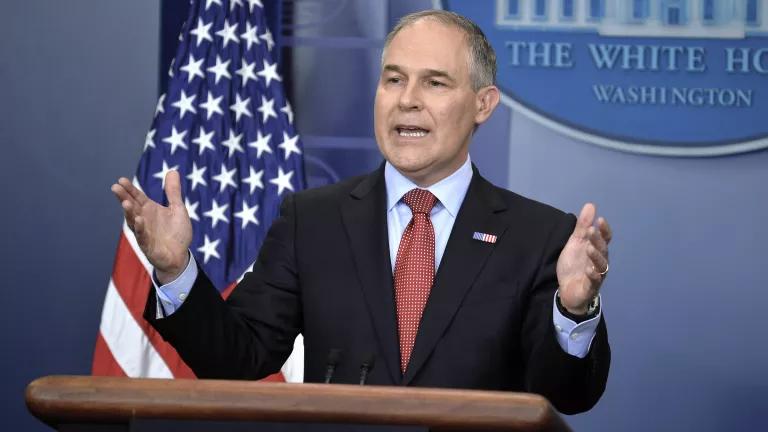Scott Pruitt Wants to Personally Decide Which Science Is Valid
Here’s why that’s bad news for our public health.

Scott Pruitt, the head of the U.S. Environmental Protection Agency, wants to grant himself the power to censor science.
By forcing the EPA to use only scientific studies with publicly available raw data, he is severely limiting the research that his agency can draw from to make its policy decisions. The move would allow him to conveniently sideline the research that helped create health standards issued under our country’s bedrock environmental laws, such as the Clean Air Act, the Clean Water Act, the Safe Drinking Water Act, and the Toxic Substances Control Act.
Many of the studies Pruitt is calling into question contain patient data and clinical reports that cannot be released publicly due to personal privacy laws. Curiously though, the rule wouldn’t hold industry-funded research to the same standard, so companies could continue to keep their “confidential business information” private. The proposal even grants Pruitt (who is not a scientist) personal veto power over which studies make the cut—something that will no doubt come in handy when dishing out favors to his buddies in polluting industries.
If finalized, policymakers would not be able to cite important public health studies—research like the landmark 1993 study that links air pollution to heart problems, lung cancer, and early death, or a recent study linking prenatal exposure to the pesticide chlorpyrifos with impaired brain development in children. Not incidentally, the coal and agrochemical industries would benefit from pushing such research under the rug.
Pruitt’s “Censoring Science Rule” is just the latest step in Pruitt’s war against science, which has included replacing the EPA’s scientific advisory boards with industry insiders and climate deniers, deleting references to climate change from the agency’s website, silencing longtime staffers about the health effects of pollution, and publicly doubting humanity’s role in climate change.
Scientists, lawmakers, and the public are not too happy about this latest anti-science move.
Rhode Island’s Senator Sheldon Whitehouse called out Pruitt’s smoke-and-mirrors game on Twitter, as did Massachusetts Senator Ed Markey.
Others rightfully pointed out that patient confidentiality doesn’t equal “secrecy.”
And nearly 1,000 scientists sent a letter to Pruitt directly, urging him to rethink his policy.
The bottom line: Only industry stands to win from Pruitt’s proposal. Ignoring peer-reviewed science certainly won’t keep Americans safer, which is supposed to be the EPA’s mission. Don’t believe Pruitt’s propaganda: His push for “transparency” is anything but.
This NRDC.org story is available for online republication by news media outlets or nonprofits under these conditions: The writer(s) must be credited with a byline; you must note prominently that the story was originally published by NRDC.org and link to the original; the story cannot be edited (beyond simple things such as grammar); you can’t resell the story in any form or grant republishing rights to other outlets; you can’t republish our material wholesale or automatically—you need to select stories individually; you can’t republish the photos or graphics on our site without specific permission; you should drop us a note to let us know when you’ve used one of our stories.


What Is the Air Quality Index?
How to Make an Effective Public Comment
How to Become a Community Scientist